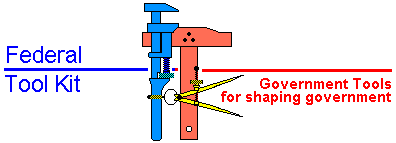
Working with Legislation
"The definition of law...is nothing other than an ordinance of reason,
promulgated by one in authority over the community, for the common good."
Thomas Aquinas Summa Theologica 2.1.q90.art4
Special Interest Groups
The critical rough shaping of Federal policy accomplished by the nation's
laws is one area in which the citizen participation can be very influential.
Even professional lobbyists and experienced interest groups depend on
organizing do-it-yourselfers to get the job done. Conversely, from the
perspective of the the individual citizen, such
special
interest or advocacy groups,
often in close touch with legislators and with timely facts at their disposal,
should be regarded as among the most important tools in the activist's
kit.
The Process
It is difficult to intervene in the life of legislation without being
familiar with the processes by which bills become law. Some guides are
available, including:
Tasks, Tools, and Techniques
With or without their aid, the would be legislative craftsman is
faced with a number of definable tasks, each of which requires slightly
different tools and techniques: choose the appropriate drawer

- Identifying bills by subject and importance
- You have heard that a bill has been introduced which
is likely to affect you. How can you identify it? How can you distinguish
"real" bills from the shams and decoys?

- Ascertaining the status and scheduling of bills
- Timely action requires that one first acquaint oneself
with the legislative process and learn what stage in the process the relevant
bills occupy. Bills scheduled for final vote are in most critical need of
intervention, but more effective action often takes place at earlier stages,
including the committee and floor debate stages. Even the final stages of
conference votes and presidential action should not be discounted.

- Ascertaining the contents of bills, resolutions, and amendments
- Usually the most informed action is the most effective.
What exactly would the effect be of proposed legislation? What is the exact
language to which you would like to object, and how would you like to see it
amended? Nothing beats precise knowledge of the text.

- Working with committees
- Among the most difficult of law-working tasks,
committee work at the professional level requires precise and expensive tools out of
the reach of individual citizens. Even amateur efforts, however, can produce
usable results. Find here a few basic tools that can help.

- Making contact
- Some of the most simple, if tedious, tasks fall
into this category: ascertaining the addresses of legislators, writing
letters, making follow-up phone calls. But so does one of the most difficult
and complex: cultivating congressmen.

- A tool kit for the road
- A basic kit of multi-pupose tools.




















